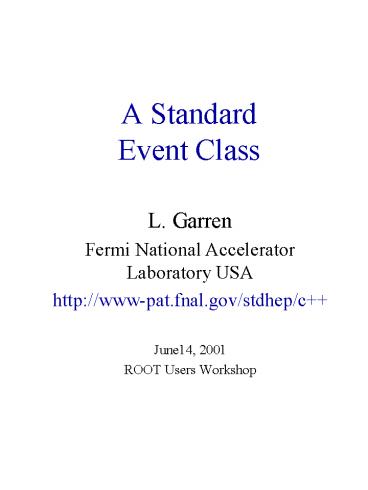A Standard Event Class - PowerPoint PPT Presentation
1 / 14
Title:
A Standard Event Class
Description:
Title: CLHEP - New Developments and Directions Author: Mark Fischler Last modified by: Mark Fischler Created Date: 1/28/2000 2:52:47 PM Document presentation format – PowerPoint PPT presentation
Number of Views:69
Avg rating:3.0/5.0
Title: A Standard Event Class
1
A Standard Event Class
- L. Garren
- Fermi National Accelerator Laboratory USA
- http//www-pat.fnal.gov/stdhep/c
- June14, 2001
- ROOT Users Workshop
2
StdHepC the first pass
- StdHepRun knows about Events
- does not contain Events
- run identifier
- begin/end run information
- StdHepEvent is a set of Collisions
- to allow for beam pileup
- StdHepCollision is a set of Particles
- StdHepParticle
- looks a lot like the HEPEVT common block
- Translation methods
- StdHepParticleData (orphan class)
3
StdHepC whats new
- Major development to utilize power of C
- HepPDT
- particle data table
- contains information from Particle Data Handbook
- a generated event is a Directed Acyclic Graph
(DAG) of vertices connected by particles - a parent may have any number of children
- a child may have more than 1 parent
- each vertex is a node on the graph
- use HepMC classes
4
StdHepC
StdHepStdEvent
HepMCGenEvent
HepMCGenVertex
HepMCGenParticle
HepPDTParticleData
HepPDTDecayData
5
HepPDT
6
HepPDTParticleData
- All the information from PDG
- HepPDTParticleID
- stdstring name
- double charge
- double color
- HepPDTSpinState (all of them)
- HepPDTMeasurement mass
- HepPDTMeasurement width
- double lowerCutoff
- double upperCutoff
- boolean methods (hasCharm)
- decay data
7
HepPDTDecayData
- stdvectorlt DecayChannel gt
- decay( int )
- decay( double random )
- size()
- appendMode( DecayChannel )
- write( stdostream )
8
HepMCGenParticle
- HepLorentzVector momentum
- HepPDTParticleID
- int status
- Flow (color, charge, )
- Polarization (theta, phi)
- production GenVertex
- decay GenVertex
- print( stdostream )
- double generatedMass
- ParticleData
- (DecayData)
9
(HepMCGenParticle continued)
- All the old HEPEVT information
- mother
- secondmother
- index to the first daughter
- index to the last daughter
- maintain compatibility
- collision number
- ltParticlegt parents()
- ltParticlegt ancestors()
- ltParticlegt children()
- ltParticlegt desendants()
10
HepMCGenVertex
- HepLorentzVector position
- stdsetltGenParticlegt incoming particles
- stdsetltGenParticlegt outgoing particles
- WeightContainer
- vector of doubles
- iterators
- methods to access ancestors and desendants
11
HepMCGenEvent
- single beam interaction
- signal process ID
- int event number
- GenVertex signal process vertex
- stdsetltGenVertexgt
- WeightContainer
- stdvectorltdoublegt random states
- iterators
- collision number
- number of particles, vertices
- parents, children, etc. methods
12
StdHepStdEvent
- Each beam crossing may have several interactions.
Therefore a StdEvent is a collection of
GenEvents. - event number
- stdvectorltGenEventgt
- translate HEPEVT to C
- ltParticlegt parents(Particle)
- ltParticlegt ancestors(Particle)
- ltParticlegt children(Particle)
- ltParticlegt descendants(Particle)
- number of particles, vertices, collisions
- accessors to return particles and vertices
- iterators
13
more utility methods
- methods to convert directly from generator output
- isParent
- isDaughter
- ltParticlegt quarkList(quark ID)
- get a list of particles containing the specified
quark - ltParticlegt stableDescendants
- ltParticlegt chargedStableDescendants
14
Conclusion
- There is a strong need for C standard Monte
Carlo generator interface. - StdHepC/HepMC is a natural object-oriented
implementation of such an interface which could
be used in ROOT - HepPDT incorporates all static particle data
information and provides a natural interface to
decay methods.














![Download NCERT Solutions for Class 10 Maths [ Free PDF ] PowerPoint PPT Presentation](https://s3.amazonaws.com/images.powershow.com/9492370.th0.jpg?_=202009160210)
















